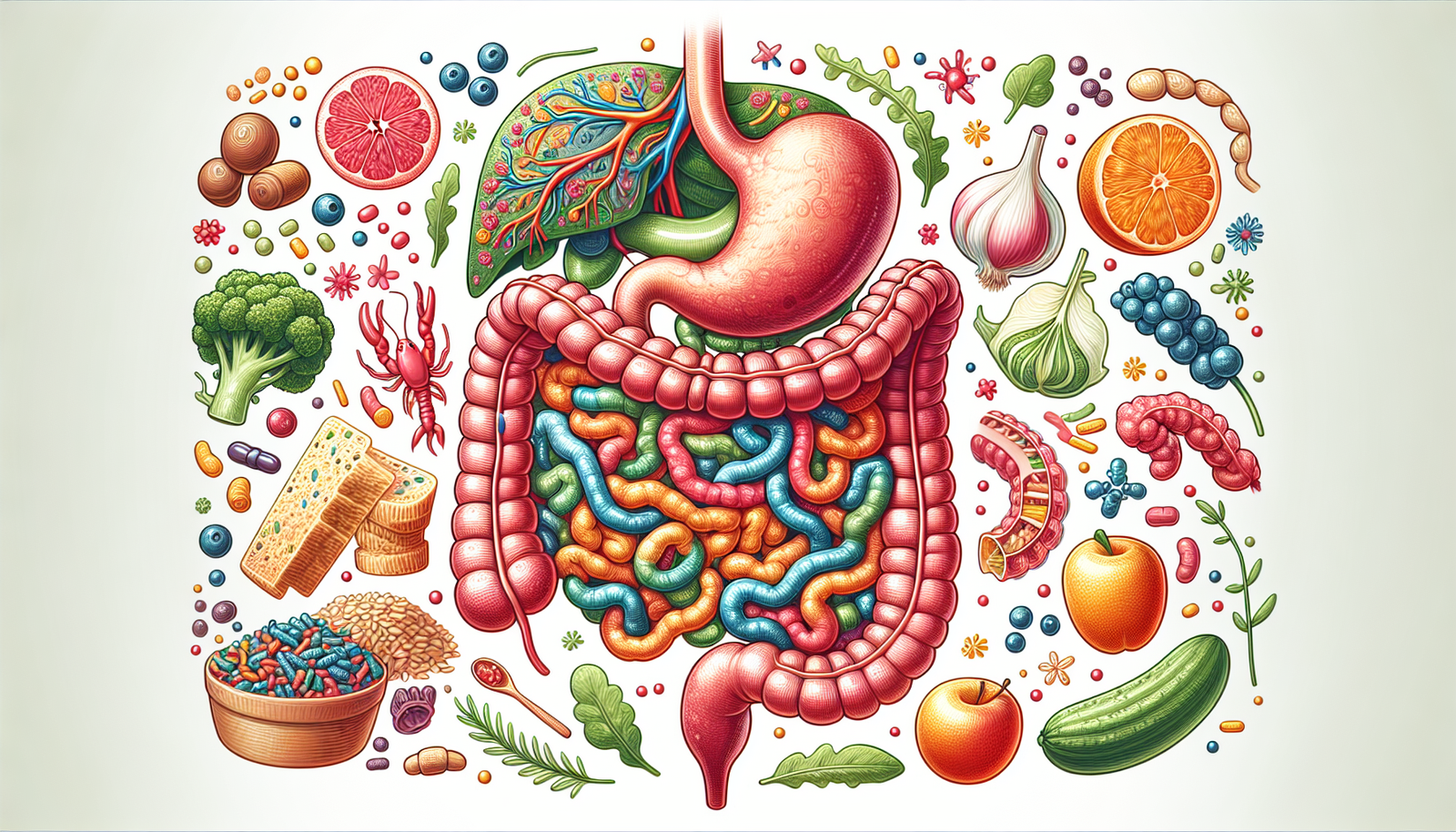Probiotics vs. Prebiotics: How They Affect Your Gut Flora
Probiotics vs. Prebiotics: Understanding Their Role in Gut Flora
What Are Probiotics?
Probiotics are live microorganisms that provide health benefits when consumed in adequate amounts. Primarily known as beneficial bacteria, they help to restore and maintain a balanced gut microbiome. Probiotics naturally reside in fermented foods and can also be taken as dietary supplements. Common strains used in probiotic products include Lactobacillus, Bifidobacterium, and Saccharomyces.
Sources of Probiotics
-
Fermented Foods:
- Yogurt: Contains active cultures that aid digestion and enhance gut health.
- Kefir: A fermented milk drink rich in various strains of probiotics.
- Sauerkraut: Fermented cabbage packed with beneficial bacteria.
- Kimchi: A spicy, fermented vegetable dish abundant in probiotics.
- Miso: A fermented soybean paste that serves as a base for soups and sauces.
- Probiotic Supplements:
- Available in various forms such as capsules, tablets, and powder, supplements often contain specific strains tailored for different health benefits.
Health Benefits of Probiotics
-
Digestive Health:
Probiotics help improve gut health by balancing harmful bacteria and enhancing nutrient absorption. They can alleviate symptoms of digestive disorders like irritable bowel syndrome (IBS), diarrhea, and constipation. -
Immune System Support:
Probiotics strengthen the intestinal barrier, enhance the response of immune cells, and prevent the colonization of pathogenic organisms. -
Mental Health:
The gut-brain axis suggests a strong connection between gut health and mental well-being. Probiotics may alleviate anxiety and depression symptoms by influencing neurotransmitter production. -
Allergy Prevention:
Certain probiotic strains may help diminish the risk of allergies and eczema in children by modulating immune responses and gut flora. - Weight Management:
Emerging studies suggest probiotics can assist in weight regulation by influencing fat storage, appetite hormones, and metabolism.
What Are Prebiotics?
Prebiotics are non-digestible fibers that selectively stimulate the growth and activity of beneficial bacteria in the gut. They serve as food for probiotics and promote a healthy gut microbiome. Common types of prebiotic fibers include inulin, oligofructose, and galacto-oligosaccharides.
Sources of Prebiotics
-
Fruits and Vegetables:
- Bananas: Particularly rich in inulin, which supports the growth of gut bacteria.
- Onions and Garlic: High in fructooligosaccharides (FOS) that encourage beneficial bacteria growth.
- Leeks: Similar to onions and garlic, leeks are potent prebiotic food sources.
-
Whole Grains:
- Barley: Contains beta-glucans, a type of soluble fiber that encourages healthy gut flora.
- Oats: Rich in soluble fiber that feeds good bacteria.
-
Legumes:
- Chickpeas and Lentils: High in fiber, they are excellent sources of various prebiotics.
- Nuts and Seeds:
- Almonds: Contain prebiotic fiber and also support heart health.
- Flaxseeds: Rich in lignans and fiber, providing multiple health benefits.
Health Benefits of Prebiotics
-
Enhanced Gut Health:
Prebiotics nourish probiotics and help sustain a healthy balance of gut bacteria. This balance is vital for optimal digestion and the prevention of disorders. -
Improved Calcium Absorption:
Certain prebiotics enhance mineral absorption, including calcium, which is crucial for bone health. -
Increased Satiety:
By increasing the feeling of fullness, prebiotics may help control appetite, contributing to weight management. -
Blood Sugar Regulation:
Prebiotics can help modulate blood sugar levels and improve insulin sensitivity, making them beneficial for individuals with diabetes. - Reduced Inflammation:
By promoting beneficial bacteria growth, prebiotics can mitigate inflammation in the gut, which is linked to various chronic diseases.
The Relationship Between Probiotics and Prebiotics
Probiotics and prebiotics work synergistically to maintain gut health. While probiotics introduce live beneficial bacteria, prebiotics provide them with the food necessary for their growth and activity. This dynamic interplay is crucial for:
-
Microbiome Diversity:
A diverse gut microbiome is associated with better health outcomes. Probiotics can introduce new strains, while prebiotics can support the growth of various beneficial species. -
Gut Barrier Function:
Together, they enhance the gut barrier, reducing permeability and preventing harmful substances from entering the bloodstream. - Metabolite Production:
Probiotics ferment prebiotics, leading to the production of short-chain fatty acids (SCFAs) like butyrate, which have anti-inflammatory effects and nourish colon cells.
Choosing Probiotics and Prebiotics
When selecting probiotics and prebiotics, consider the following factors:
-
Strain Specificity:
Different probiotic strains play different roles in the body. Choose strains based on specific health goals (e.g., Lactobacillus rhamnosus for digestive health). -
CFU Count:
The potency of probiotics is often measured in colony-forming units (CFUs). Look for products that provide an adequate dose for your health needs. -
Synergy:
Some products combine both probiotics and prebiotics, often labeled as synbiotics, which can enhance efficacy. -
Dietary Sources:
Aim to include fermented foods for probiotics and high-fiber foods for prebiotics in your daily diet for optimal gut health. - Individual Considerations:
Personal health conditions, dietary restrictions, and preferences should guide your choices. Consult a healthcare provider or nutritionist for personalized recommendations.
Possible Side Effects
While probiotics and prebiotics are generally safe, some individuals may experience:
-
Digestive Discomfort:
Initial bloating and gas may occur when introducing them into the diet, particularly if done suddenly. -
Infections:
Immunocompromised individuals should consult with healthcare professionals, as probiotics can pose risks in certain populations. - Interference with Medications:
Probiotics may affect the absorption or effectiveness of certain medications, particularly antibiotics, necessitating careful timing.
Current Research Directions
-
Personalized Nutrition:
Ongoing research aims to develop personalized probiotics and prebiotic strategies tailored to individuals’ gut microbiomes and health needs. -
Gut-Brain Axis Studies:
Investigating the effects of probiotics on mental health and cognitive functions offers promising insights into how gut health influences overall well-being. - Chronic Diseases:
Studies explore the role of prebiotics and probiotics in managing conditions like obesity, diabetes, and inflammatory diseases, aiming to establish clearer guidelines for dietary interventions.
Conclusion of Findings
The relationship between probiotics, prebiotics, and gut flora is complex yet increasingly understood. Together, they play a pivotal role in promoting gastrointestinal health, immune function, and overall well-being. By incorporating a variety of both in your diet, you not only support your intestinal flora but also enhance your health on multiple fronts. Your gut health is foundational to various bodily functions, making the understanding and use of probiotics and prebiotics critical for maintaining a balanced microbiome.
By embracing both probiotics and prebiotics within a well-rounded diet, individuals can take proactive steps towards optimizing gut health and achieving a healthier lifestyle.








